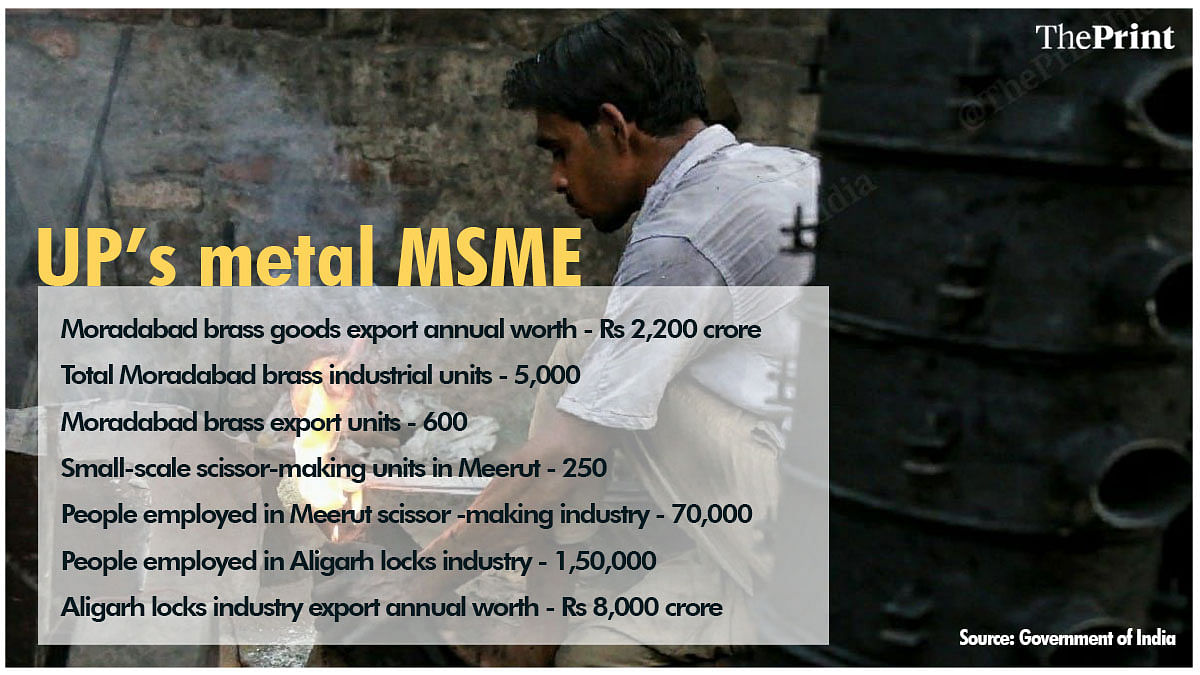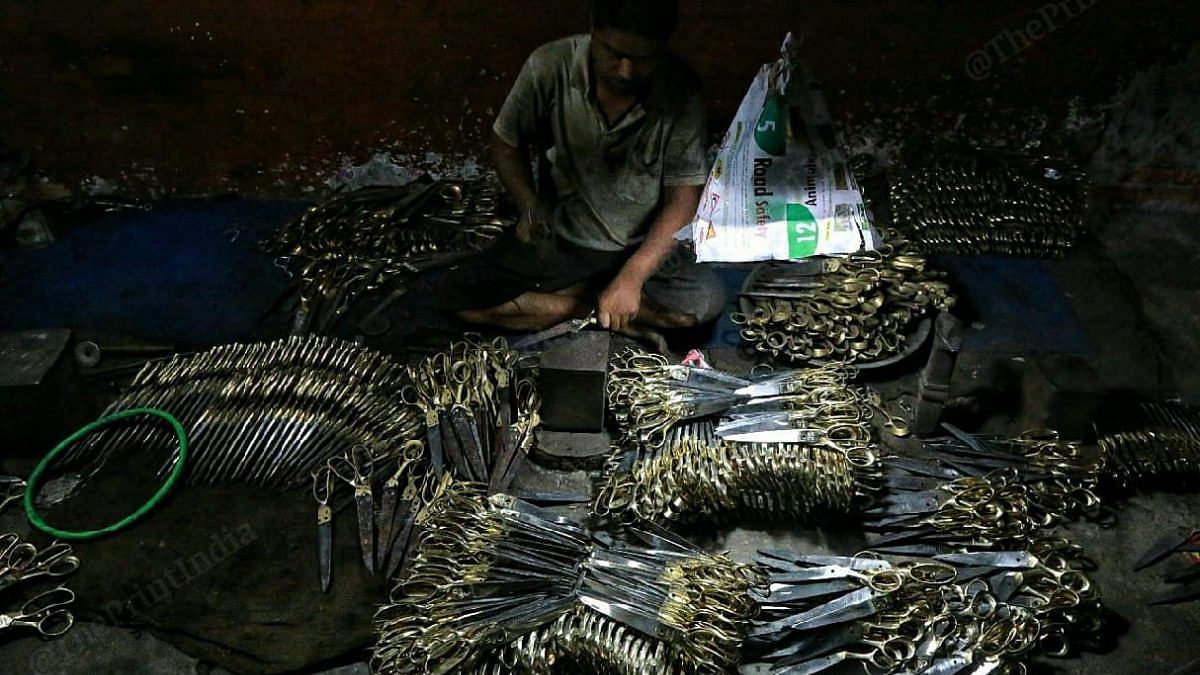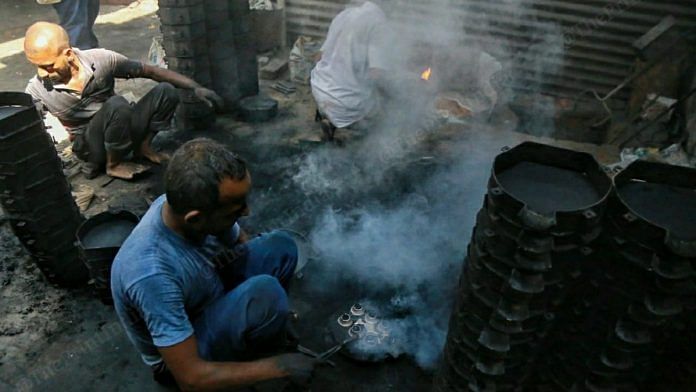New Delhi: Forty-three-year-old Fazal Rahman has always worked in his ancestral occupation of managing a brass smelting and casting unit in the Mohammadpur Bastaur area of Moradabad district, known as ‘peetal nagri (brass city)’, but has never seen a downturn in the sector as grave and prolonged as this one.
He and all his artisans took heavy loans during and after the pandemic-induced lockdowns, and repaying these is turning out to be difficult. Inflation has pushed up livelihood expenses, while work remains sluggish due to tepid demand as well as a spike in the price of coal to Rs 70 per kg from Rs 36 a kg in the last two months.
“Edible oil has crossed Rs 100, but the labour still earns just Rs 400-500 a day. They have no option but to take up other jobs to repay their loans of about Rs 40,000 to Rs 50,000 with high interest rates of 18-30 per cent,” Rahman told ThePrint.
Rahman’s troubles are echoed throughout Mordabad’s peetal nagri, which is part of the Centre’s as well as the Uttar Pradesh government’s ambitious ‘One District One Product’ (ODOP) scheme, and the situation of such Micro, Small and Medium Enterprises (MSMEs) in the rest of Uttar Pradesh too is no different.
The lockdowns intensified their pre-existing hardships as these companies were limping back from the blows of demonetisation and the introduction of the Goods and Services Tax (GST). Rising energy prices, raw material costs and cut-throat competition amid dwindling demand have further stressed these units.
According to data with the Union MSME ministry, lakhs of people are employed in manufacturing Moradabad’s massive brass items such as handicrafts and utensils. It has a total annual turnover upward of Rs 10,000 crore with exports to markets such as the US, Canada, Australia and the European Union.
Also read: Shutdowns, debts, layoffs: Bengal tanners pushed to the edge say 3rd Covid wave will finish us
Entrepreneur turned into labourer, market size down by 65%
The distress has turned Mohammad Azeem into a labourer from a entrepreneur. Azeem used to supply brass utensils and miniature figurines made by people like Rahman to shopkeepers and exporters in Delhi and other major cities.
“I used to keep 5-7 people under me with a salary of Rs 11,000 a month each. Now, I’m myself in debt and employed at another place for Rs 19,000 a month,” Azeem told ThePrint.
“Earlier we used to supply 500-800 kg of brass items per month, which has dropped to 125-200 kg. Transport cost has also jumped from Rs 300 a piece to Rs 550-600,” he added.
Azeem explained how the rising input cost pushed up the cost price of products to almost Rs 700-800 a kilogram, prompting cancellation of orders, which were booked earlier at prices as low as Rs 400-500 a kilogram.
“The order cancellations rendered the ready items useless. It also created a trust deficit across the sector,” he said. “Due to losses, order decline and delay in payments, we have shifted to another sector of iron or steel items and now I’m working in someone else’s factory.”
Azam Ansari, a member of Mordabad’s Brass Manufacturers’ Association told ThePrint that according to his estimates, the peetal nagri’s renowned brass industry has lost 65 per cent of its market size since 2008-09, plunging to a net worth of Rs 7,500 crore from Rs 20,000 crore back then.
“Over 14 per cent of artisans have left the field as costs have increased making our products uncompetitive in global export markets. In 2019, the slab rate of brass was Rs 300/kg, which has jumped to Rs 510/kg now,” Azam Ansari said.
“Even aluminum, which was introduced as an alternative, has surged from Rs 125-135/kg to Rs 205-210/kg just in the last two months. Other costs such as diesel prices jumped from Rs 65-75 to over Rs 100, while electricity prices have increased from Rs 7-8 per unit to Rs 14/unit in the last year.
“With declining demand and increasing cost, manufacturing is just at 65 per cent of normal levels. Revenues are 25 per cent lower than normal,” Azam added. “There is a severe crunch in the flow of working capital as everyone’s money is stuck in previous orders.”
Many big players who make export grade premium brass products for domestic and abroad markers are also unnerved by Covid disruptions.
Simon Morrison, owner of Aijal Handicraft in Moradabad, an exclusive and personalised brass and steel architectural items company, told ThePrint, “The cost of raw material was actually deflated in the lockdown, but we couldn’t use it to our advantage as everything was closed. Lately, it has shot up by at least 33 per cent. Shipping cost is also doubled. When the pandemic first hit all the payments stopped, even when goods were ready, buyers didn’t want them at all. It was the same in the domestic and export markets with different timelines.”

Aligarh’s lock makers try e-commerce platforms
Other metal-related MSMEs in different districts of Uttar Pradesh are staring at similar problems due to a hike in the cost of raw materials.
Reena Agarwal, owner of Ruvaa Locks and Hardware in Aligarh, which is known for locks under the ODOP scheme, was forced to scale down her operations due to increasing costs.
“We have come down from two plants to one, and 120 employees to just 50 now. All types of metal like iron, aluminium and brass used in making locks have undergone severe price hikes of 10-15 per cent,” Agarwal told ThePrint. “The costing has fallen out of sync, and orders at pre-decided rates are either getting cancelled or we are being forced to complete them at a loss.”
According to information with the Union MSME ministry, the Aligarh lock industry employs nearly 1.5 lakh skilled and unskilled workers with exports of over Rs 8,000 crore.
“The manufacturing cost has increased at least by 20 per cent on previous orders that are yet to be fulfilled. Our margin itself is 10-15 per cent, so it’s proving to be a loss-making business for us now,” she added. “Our sector is heavily dependent on the health of other sectors such as real estate, which are sluggish and it has affected us.”
Agarwal further said her company is trying to market its products on e-commerce platforms such as IndiaMART, Amazon and Flipkart, but the sales are so low that it is yet to make a difference.
Vikas Bansal, another lock manufacturer from Aligarh who has shifted a portion of his portfolio to online platforms to recoup losses, told ThePrint the market is “not ready yet to accept the price of finished products” after accounting for the steep rise in raw material prices.
According to India Ratings and Research, coking coal prices have jumped by 103 per cent between August this year and last. Similarly, according to an IMF report, metals prices increased by 72 per cent relative to their pre-pandemic levels reaching a nine-year high with a broad-based increase across industrial metals.
The increase in metal prices are mainly attributed to global manufacturing-based recovery while many mining operations were temporarily disrupted by Covid-19. This was worsened as freight rates reached a 10-year high due to congestion in key ports, quarantine restrictions and surging fuel prices.
Mordabad’s Ansari said, “Many PSUs and other big metal factories like Hindalco cut down their operation leading to less scrap production. This was further aggravated by high international market duties leading to non-availability of scraps.”
Also read: Small units pack up, weavers prefer to be guards: How Covid ruined Karnataka garment industry
Lack of scraps cut Meerut’s scissor industry
Meerut, which has a Geographical Indicator (GI) tag for its trademark scissors, has been making the product for more than three centuries using metal scrap.
The city boasts of 250 small-scale scissor-making units, employing 70,000 people directly or indirectly, according to the Union government’s GI journal.

Sharif Ahmed, president of the Meerut Scissor Manufacturers’ Association who also owns a production unit, told ThePrint, “The blade of scissors are made from scrap metal found in cars, buses, trucks and railways. The handles are made from scrap of plastic, aluminium or alloys sourced from aluminium and brass utensils. However, with lockdown, the movement of scrap from auctions and even its creation from factories stopped, leading to an increase in prices.”
Ahmed said there is a new rate every Sunday, and in the last two weeks itself, the price of scrap has increased to Rs 170/kg from Rs 120/kg.
“Due to increasing manufacturing prices orders are getting cancelled,” he added. “Before lockdown, the turnover of the city’s scissor industry was Rs 50-60 crore annually. This has halved with factories reducing from 250 to 175.”
No loans, GST complicating issues
Small business owners also complain of often being denied loans under the government’s low-interest schemes rolled out mainly to help the pandemic-distressed MSMEs.
“Banks don’t give access to government low-interest loans to small businesses on account of a low frequency of transactions or absence of ITR and GST as much of their work is in cash,” Ahmed said. “Though the government has given a relaxation that businesses below a particular turnover don’t have to show GST records, banks keep asking for it and deny us any scheme benefits.”
“If we start a business of Rs 10 lakh, we have to give the government 18 per cent of it (as GST), which is Rs 1.8 lakh,” Azam Ansari said. “We get a refund only after three or four months when the order is finalised. It gets very complicated. Why collect GST from small players when you have to refund it? Artisan, shopkeeper, exporter, everyone’s money is stuck in the GST.”
Kanishk Maheshwari, co-founder and managing director of Primus Partners, a management consulting firm, seconded the concerns.
“MSMEs have taken a huge hit since issues before the pandemic such as GST,” Maheshwari told ThePrint. “The government can pitch in by addressing their cash hold through expediting payment and supplies via the MSME facilitation council. Bulk of MSMEs’ capital is stuck in GST refund, which the Ministry of Finance can expedite to give a boost to cash flow.”
(Edited by Arun Prashanth)
Also read: ‘Where’s Atmanirbhar package?’ — Telangana MSMEs struggle to pay wages, rent for 1-room business



